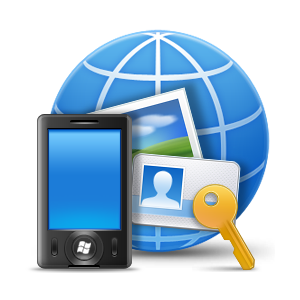As mobile phones have become more powerful the need to access and backup information on them has increased. One way to do this is to mesh your phone’s operating system on a central server as pioneered by Danger’s Sidekick and emulated by Google’s Android and Palm’s WebOS. If something happens on the phone, it’s automatically synced to your account in the cloud and this, in theory, prevents data loss (that company is called ‘Danger’ for a reason).
 I have been using a Windows Mobile phone for the past 18 months and have been looking for a way to sync my data wirelessly for some time. A while back I installed the beta of Microsoft’s MyPhone service but never got it working correctly. Not sure if it was something I was doing wrong but such services should just work without a lot of user intervention and MyPhone never got there despite repeated effort in it’s beta form (it sort of worked for me once launched; read on for details).
I have been using a Windows Mobile phone for the past 18 months and have been looking for a way to sync my data wirelessly for some time. A while back I installed the beta of Microsoft’s MyPhone service but never got it working correctly. Not sure if it was something I was doing wrong but such services should just work without a lot of user intervention and MyPhone never got there despite repeated effort in it’s beta form (it sort of worked for me once launched; read on for details).
Last week Best Buy launched their mIQ service which I noticed supported Windows Mobile so I signed up and a couple days ago was sent my account invitation. After a somewhat complex setup process that involved both the handset and computer browser, I was ready to sync. And after quite a while it seemed to be about the same as MyPhone; not really working. So I rebooted my phone, started again and this time let it sync overnight in it’s charging stand. The next morning when I checked the phone had fully synced and after a logout and login all my photos, contacts, calendar entries, text messages and other data was backed up in the mIQ service online, as advertised. My one suggestion is that the status screens on the phone be a bit more clear that something is happening since I think the sync would have worked the first time without my reboot (just a more animated status bar would work here).
Both mIQ and MyPhone are linked to popular social sites. MyPhone supports Windows Live, Facebook, MySpace and Flickr while mIQ links to Twitter, Friendfeed, Facebook and Flickr. On the phone the mIQ service lets you update status on these services from their client, a nice touch. mIQ integrates all the communications for each contact in it’s web app so you can see all the text messages and phone calls linked to each contact. It also lets you send SMS messages from the web and easily make Skype calls to your contacts if you have a Skype out account on your computer. mIQ easily allows you to share photos and videos from the web app and seems to be automatically set to push these as they are taken from your phone by default. mIQ also has helpful stats on your phone memory usage that cleverly links to memory cards available at Best Buy making it easy to buy what you need for your phone. Overall, mIQ is very complete, stable and useful for a first release service. Along with Windows Mobile, mIQ also currently supports Blackberry and Symbian (mostly Nokia) smartphones.

MyPhone is a basic backup service with one killer feature in it’s freemium mode. Like mIQ, MyPhone backs up contacts, calendar, text messages, call history, videos, music and tasks but adds the Apple MobileMe-like ability to find your lost phone. For an additional fee, MyPhone will allow you to ring your lost phone remotely (presumably to find it in the cushions or antagonize whoever has it), lock or remotely erase it. This feature alone will be enough to sway many people to use MyPhone but in my testing I found issues that outweighed this advantage over mIQ. The first annoyance was all the photos in my web browser cache were synced and then for no apparent reason replicated back to the internal memory of the phone. Not only did this take a long time but it completely filled the internal memory of the phone causing all sorts of problems. The next issue I had with MyPhone was that contacts, tasks and calendar entries are not backed up if they are linked to Exchange servers. Since I use Exchange sync with my Google account, MyPhone did not back up any of this information. mIQ, on the other hand, had no problems backing up all this data. Lastly, MyPhone’s free service limits you to 200MB while Best Buy’s mIQ gives you 1 GB of storage.
Overall, both MyPhone and mIQ will backup data from your Windows Mobile phone and make media more accessible and sharable. But for me Best Buy’s mIQ service was easier to use and more useful than Microsoft’s MyPhone. If you have one of the supported smartphones, I encourage you to check out mIQ here.